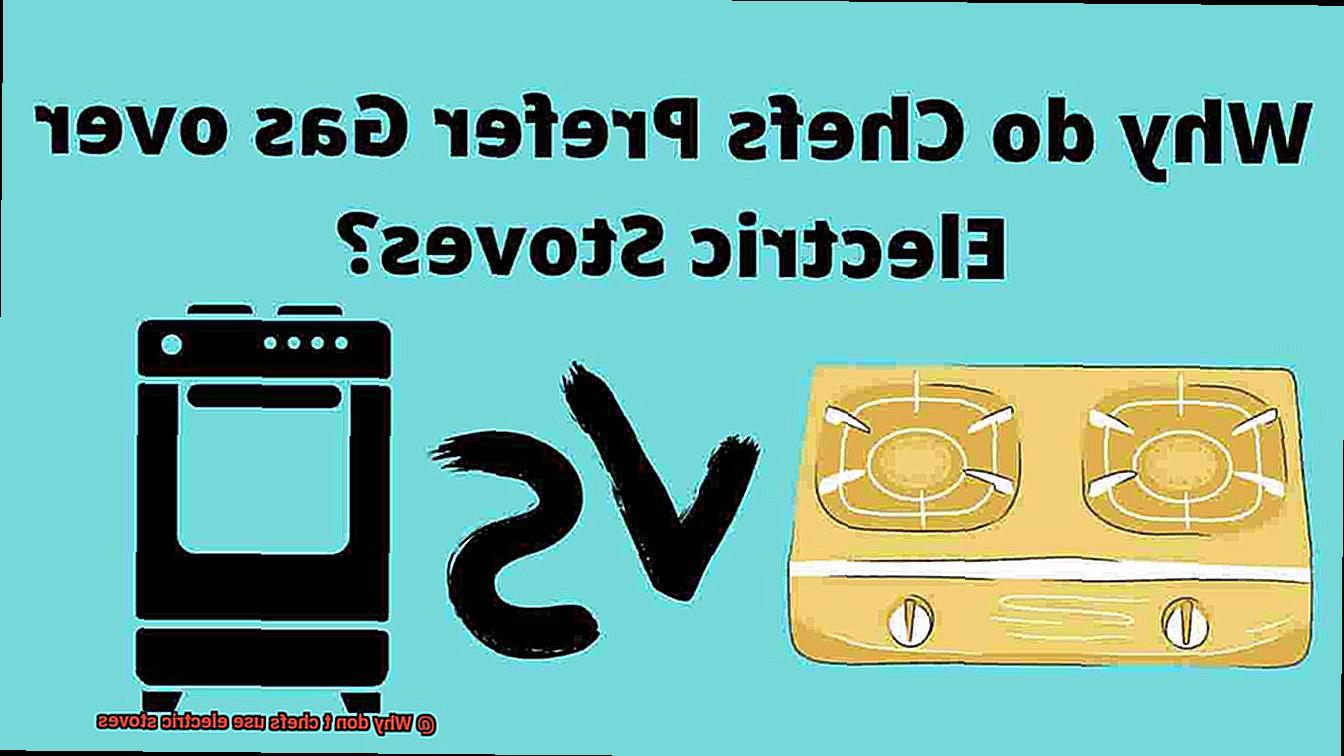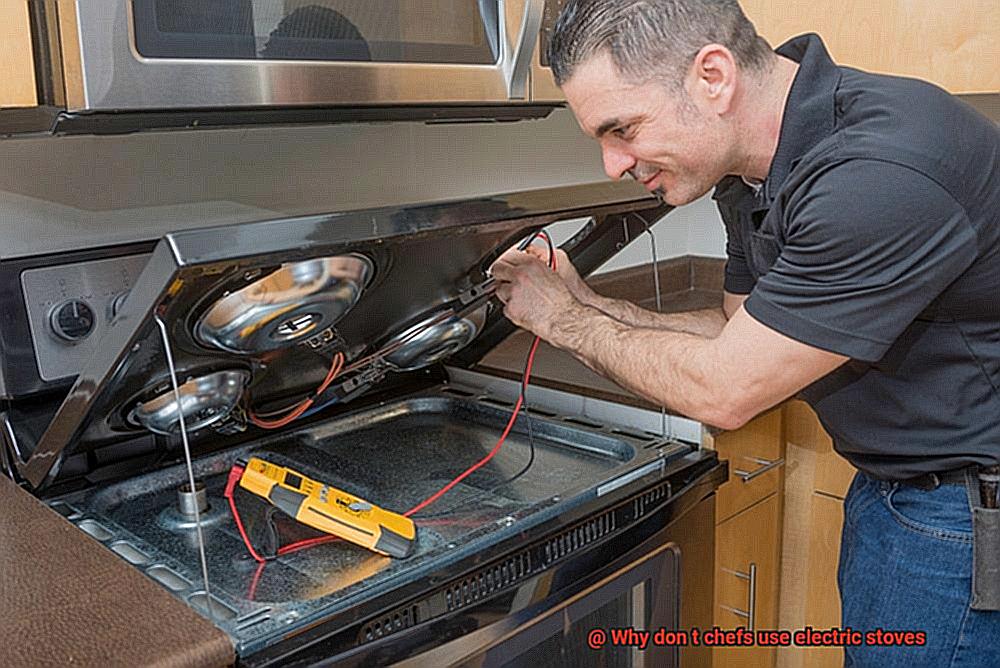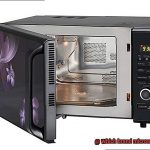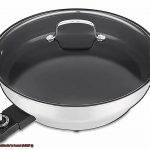Picture yourself walking into a bustling restaurant kitchen and seeing the chefs huddled around gas stoves instead of electric ones. Have you ever wondered why chefs choose gas over electric? Well, the answer might just blow your mind.
Most professional chefs and cooking enthusiasts swear by gas stoves. Why? Because they heat up quickly and offer precise temperature control, giving chefs god-like power over their dishes. Electric stoves, on the other hand, are less responsive to temperature changes and lack that fiery spark that gas stoves provide.
Chefs rely on cookware for different techniques, and they need both open flame and heat control to achieve culinary perfection. That’s why they naturally gravitate towards gas stoves. Despite their widespread use in homes across America, electric stoves have certain limitations that make them less desirable in a professional kitchen setting. It’s difficult to apply cooking techniques like searing or braising when you can’t control the temperature precisely.
In this blog post, we’re going to explore why chefs prefer gas stoves over electric ones, how it affects their cooking process, and the science behind it all. So sit back, relax, and let’s ignite our passion for cooking as we uncover the truth about why chefs don’t rely on electric stoves.
Contents
Reasons Why Chefs Prefer Gas Stoves
Gas stoves have been the go-to choice for chefs for many years, and for good reason. Here are five key reasons why chefs prefer gas stoves over electric ones.
Precise Temperature Control
One of the main reasons why chefs prefer gas stoves is that they offer more precise temperature control. With gas stoves, the heat can be easily adjusted, allowing the chef to increase or decrease the temperature as needed. This precision is especially important when cooking delicate dishes that require a steady, even heat.
Open Flame
Another reason why chefs prefer gas stoves is that they provide an open flame. The open flame allows the chef to see the heat source and adjust it accordingly. With electric stoves, the heat source is hidden beneath a glass surface, making it difficult to see and adjust.
Even Distribution of Heat
Gas stoves also offer a more even distribution of heat compared to electric stoves. The flame heats the entire bottom of the pan evenly, whereas electric stoves can create hot spots or uneven heating due to the design of the heating element. This feature ensures that dishes are cooked evenly and thoroughly.
Responsiveness to Temperature Changes
Additionally, gas stoves are more responsive to temperature changes. When you turn down the heat on a gas stove, it immediately cools down, whereas electric stoves take longer to cool down because the heating element retains heat. This feature is crucial when cooking dishes that require quick changes in temperature.
Authentic Cooking Experience
Finally, gas stoves offer a more authentic cooking experience. Many chefs prefer to cook with an open flame because it allows them to create a char or sear on their food that is difficult to achieve with an electric stove. Gas stoves provide a more authentic cooking experience that allows chefs to create delicious dishes quickly and efficiently.
In conclusion, chefs prefer gas stoves over electric ones due to their precise temperature control, open flame, even distribution of heat, responsiveness to temperature changes, and authentic cooking experience.
Heats Up Quicker
As any professional chef will tell you, the speed at which a stove heats up is a crucial consideration when it comes to cooking. Gas stoves have long been the go-to choice of chefs worldwide because of their ability to heat up quickly, making them an ideal option for busy kitchens where time is of the essence.
So, why do gas stoves heat up quicker? Well, it all boils down to their open flame design, which heats up cookware directly. In contrast, electric stoves rely on heating elements that take longer to reach the desired temperature and can make it challenging for chefs to control the heat and adjust it quickly when cooking. Waiting for an electric stove to heat up can waste valuable time and slow down the cooking process.
In a professional kitchen, time is money. Chefs need to be able to work quickly and efficiently. This is where gas stoves come into their own: they can be turned on and off instantly, allowing chefs to control the heat and cook more efficiently. This is particularly useful when cooking delicate dishes that require precise temperature control.
Apart from the heating mechanism, the type of cookware used also affects how quickly a stove heats up. Gas stoves work best with heavier cookware like cast iron or stainless steel because they retain heat better and distribute it evenly. In contrast, electric stoves work better with lighter cookware such as aluminum or copper-bottomed pans because they heat up quickly and evenly.
More Responsive to Temperature Adjustments
The answer is simple: gas stoves offer better temperature control.
As an expert in the field, I can tell you that electric stoves are less responsive to temperature adjustments than gas stoves. Electric stoves take too much time to heat up and cool down, making it difficult for chefs to cook certain dishes that require quick temperature changes. For instance, when cooking delicate sauces or simmering dishes, the temperature needs to be adjusted quickly and precisely to avoid overcooking or undercooking. This is a challenge with electric stoves.
Moreover, electric stoves cannot generate high heat levels as quickly as gas stoves. This makes it difficult for chefs to sear meats or sauté vegetables at high temperatures, which can result in uneven cooking. Electric stoves may also take longer to heat up a pan, especially if the pan is made of cast iron or other materials that require high heat levels.
This is where gas stoves come in. Gas stoves provide more control over the heat source. Chefs can adjust the flame instantly, allowing them to cook more precisely and efficiently. They can also see the flame, which helps them gauge the amount of heat being applied to the food. This level of control is simply not possible with electric stoves because their heating elements are hidden beneath a smooth surface.
In summary, professional chefs prefer gas stoves because they offer more responsive temperature adjustments than electric stoves. Gas stoves allow for precise cooking and better heat control, which is crucial in producing perfect dishes. While electric stoves may have their advantages, they are not suitable for professional chefs who need to cook quickly and efficiently.
Even Distribution of Heat
While the ingredients, seasonings, and techniques are crucial, the even distribution of heat is an essential factor in achieving a perfectly cooked dish. It’s no surprise that chefs prefer gas stoves over electric ones due to their ability to provide an even distribution of heat.
The reason for this preference is simple – gas stoves use open flames that heat up the bottom of the cookware directly. This allows for a more even distribution of heat, resulting in evenly cooked food with no hot spots or undercooked areas. The importance of even cooking is especially evident when preparing delicate dishes that require precise temperature control.

On the other hand, electric stoves use heating coils that take a while to heat up and cool down. Additionally, the heat is not evenly distributed as it only comes from the coils at the bottom of the cookware. This can cause hot spots and uneven cooking, making it challenging to achieve an even temperature throughout the cooking process.
Apart from even cooking, gas stoves also offer more control over the heat. Chefs can adjust the flame to their liking, allowing for precise temperature control and reducing the chances of overcooking or undercooking. In contrast, electric stoves only have two temperature options – on or off – with no room for in-between options.
To sum it up, gas stoves are preferred by chefs because they provide a more consistent and even heating source compared to electric stoves. This allows for precise temperature control and reduces the likelihood of uneven cooking. If you’re looking to take your cooking game to the next level, consider investing in a gas stove – your taste buds will thank you.
Safety and Efficiency Concerns
In the world of cooking, safety and efficiency are vital. While gas stoves are a popular choice for many chefs, electric stoves also have their benefits. As an expert in safety and efficiency concerns, let me guide you through the pros and cons of electric stoves.
Firstly, safety is crucial in any kitchen. Electric stoves are considered safer than gas stoves because they don’t have open flames. However, if not used correctly, they can still pose a fire hazard. Always follow the manufacturer’s instructions and keep flammable materials away from the stove.
Another safety concern with electric stoves is that they take longer to heat up and cool down. In a busy kitchen where timing is essential, this can be a disadvantage. Gas stoves are quicker to adjust the temperature, making them a better fit for speedy cooking.
Efficiency is also a significant factor in choosing between gas and electric stoves. Electric stoves lose heat more quickly than gas stoves, making them less efficient. It takes longer for them to reach the desired temperature, leading to longer cooking times and potentially overcooked or undercooked dishes. Additionally, electric stoves require more energy to operate, which can increase electricity bills.
Despite these drawbacks, electric stoves are ideal for certain situations. For example, if natural gas is unavailable in your area or ventilation is limited, electric stoves may be your only option. They are also simpler to clean and maintain than gas stoves, making them a top pick for home cooks.
Advantages of Electric Stoves
Say goodbye to that hassle with electric stoves, which are a breeze to clean. Unlike gas stoves, electric stovetops have a smooth surface that wipes down easily, making it easy to maintain a spotless kitchen.
Not only are electric stoves easy to clean, but they are also more energy-efficient than gas stoves. With faster heating times, electric stoves require less energy to get the job done, leading to lower electricity bills and reduced energy consumption for your home.
Precision temperature control is another major advantage of electric stoves. With digital controls or touchpads, you can set the exact temperature you need for your recipe. This level of precision is especially helpful when cooking delicate dishes that require specific temperature control.
Furthermore, safety is always a top priority in any kitchen. Electric stoves emit no harmful gases or fumes, making them safer for your home. This is particularly important if you have young children or pets in your household.
Disadvantages of Electric Stoves
Many professional chefs still prefer to use gas stoves in their kitchens for a variety of reasons. Let’s delve deeper into the disadvantages of electric stoves.
Firstly, electric stoves have a slow heating time compared to gas stoves, which heat up instantly. This can be frustrating for chefs who need to cook quickly and efficiently. Waiting for an electric stove to heat up can significantly affect workflow and productivity in the kitchen.
Secondly, electric stoves lack temperature control. Unlike gas stoves, which allow chefs to adjust the flame to control the temperature of the cooking surface precisely, electric stoves have a fixed temperature range that cannot be adjusted as easily. This limitation makes it challenging to achieve the perfect temperature for certain dishes, especially those that require quick temperature changes like sautéing or searing.
Thirdly, electric stoves are not compatible with all types of cookware. Cast iron and copper pots and pans are not recommended for use on electric stoves because they can scratch or damage the glass surface. This limits the type of cookware that can be used on electric stoves and may require chefs to invest in new pots and pans, adding to their expenses.
Lastly, once an electric stove has been turned off, it takes longer to cool down compared to gas stoves. This can be dangerous for those who are not accustomed to using electric stoves and may accidentally touch the hot surface, leading to burns or injuries.
Pros and Cons of Both Types of Stoves
Choosing between an electric and gas stove can be a tough decision, as both have their own set of pros and cons. In this article, we will explore the advantages and disadvantages of each type of stove to help you make an informed decision.
Electric Stoves:
Pros:
One of the main advantages of electric stoves is their even cooking capabilities. They provide consistent temperatures, making them ideal for dishes that require precise cooking times. Additionally, electric stoves are safer than gas stoves because there is no open flame or risk of gas leaks. This makes them a great choice for households with children or pets.
Another benefit of electric stoves is that they are easy to clean. The smooth surface makes it easy to wipe away spills and messes. And unlike gas stoves, there are no grates or burners to remove for cleaning.
Cons:
One of the most significant drawbacks of electric stoves is their slower heat-up and cool-down times. This may not be ideal for chefs who need to cook large quantities of food quickly. Additionally, electric stoves require specific cookware, such as flat-bottomed pots and pans, which can limit the types of dishes you can prepare.
Gas Stoves:
Pros:
Gas stoves are favored by many chefs because of their precise temperature control and faster heat-up times. They allow for sudden temperature changes and quick searing of meats. Gas stoves also offer more versatility in terms of the types of cookware you can use.
Another advantage of gas stoves is that they provide instant heat. This is useful when cooking for large crowds or in a professional setting where time is of the essence.
Cons:
One potential risk associated with gas stoves is their fire hazard. They require a gas line hookup, which can pose a risk if not installed correctly or if there is a gas leak in your home. Additionally, gas stoves can be more expensive to purchase and maintain than electric stoves.
Another disadvantage of gas stoves is that they can be more difficult to clean than electric stoves. The grates and burners require extra attention to remove any food particles or grease buildup.
Benefits and Drawbacks of Using an Electric Stovetop
With so many options available, it can be challenging to determine which one is right for you. In this article, we’ll explore the benefits and drawbacks of using an electric stovetop.
Let’s start with the benefits. One of the most significant advantages of electric stovetops is their quick heating time and ease of control. Additionally, they come equipped with extra safety features such as automatic shut-off and child locks, making them an excellent choice for households with kids or pets. And let’s not forget about how easy they are to clean and maintain – no need to worry about scrubbing grime off of gas burners.
However, there are also some drawbacks to consider. One issue with electric stovetops is that they don’t provide the same level of heat control as gas stovetops. This can be problematic for professional chefs who need precise temperature control to create consistent dishes. Additionally, electric stovetops can take longer to cool down than their gas counterparts, which can make it tricky to adjust temperatures quickly when cooking dishes that require rapid temperature changes.
Finally, electric stovetops are generally less energy-efficient than gas stovetops, which can result in higher energy bills over time. This is something to keep in mind for both households and professional kitchens alike.
Tips for Selecting the Right Type of Stove for Your Kitchen
When it comes to selecting the right type of stove for your kitchen, there are several key factors that you need to consider. These include the type of fuel, your cooking needs, safety concerns, power source availability, cleaning and maintenance requirements, and personal preferences.
The first factor to consider is the type of fuel that the stove uses. Gas stoves are preferred by many professional chefs due to their precise temperature control and high heat output. They also heat up quickly and offer faster cooking times. However, electric stoves are more popular among homeowners due to their convenience and ease of use.
Your cooking needs and preferences are another important consideration when selecting a stove. If you frequently cook with high heat or need precise temperature control, a gas stove may be the best option for you. On the other hand, if you prefer the convenience and ease of use of an electric stove, there are many advanced models available on the market that offer excellent performance.
Safety is also a crucial factor to consider when selecting a stove. If you have small children at home or are concerned about burns or fires, an electric stove may be a better choice. They have a flat surface that is less likely to cause accidents and many models come with child safety locks.
Power source availability is another consideration. If you live in an area where gas is not available or your kitchen is not equipped for a gas stove, an electric stove may be your only option. Additionally, some homeowners prefer electric stoves because they are easier to clean and maintain than gas stoves.
Lastly, personal preference plays a significant role in choosing the right type of stove for your kitchen. It’s essential to test out both types of stoves before making a final decision to see which one suits your cooking style and needs best.
Common Mistakes to Avoid When Using an Electric Stovetop
Attention all home chefs. Did you know that there are some common mistakes that people make when using an electric stovetop? These mistakes not only affect the quality of your cooking but also pose a safety hazard. Don’t worry though, as an expert in this area, I have compiled a list of the top five mistakes to avoid when using an electric stovetop.
Firstly, failing to preheat your stove before cooking can result in uneven heat distribution. Take a minute or two to preheat your stove to ensure your food is cooked to perfection.
Secondly, using the wrong cookware can cause damage to your electric stovetop. Opt for flat-bottomed cookware made of materials like stainless steel, aluminum, or copper. Avoid glass or ceramic cookware as they can scratch the surface and cause damage.
Thirdly, overcrowding the cooktop can cause uneven heating and increase the risk of spills and accidents. So, avoid overcrowding and use only the necessary pots and pans.
Fourthly, resist the temptation to turn up the heat too high. Using high heat settings can damage your electric stovetop and increase the risk of fires. It’s better to use low or medium heat settings for optimal results.
Lastly, neglecting to clean your electric stovetop regularly can lead to food spills and grease buildup, making it difficult to clean and potentially causing a fire hazard. Make sure to clean your electric stovetop regularly with a non-abrasive cleaner.
0DqSShVuqWE” >
Conclusion
After conducting extensive research on the topic, it is clear that chefs prefer gas stoves over electric ones.
The main reason for this preference is the instant and precise heat control that gas stoves offer, allowing for more efficient and accurate cooking. Additionally, gas stoves are generally more durable and reliable than their electric counterparts.
While electric stoves may have some advantages such as being easier to clean and having a sleeker appearance, they simply cannot match the performance of gas stoves in a professional kitchen setting.






